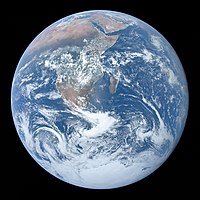
Photo from wikipedia
We present a line-by-line differential analysis of a sample of 16 planet hosting stars and 68 comparison stars using high resolution, high signal-to-noise ratio spectra gathered using Keck. We obtained… Click to show full abstract
We present a line-by-line differential analysis of a sample of 16 planet hosting stars and 68 comparison stars using high resolution, high signal-to-noise ratio spectra gathered using Keck. We obtained accurate stellar parameters and high-precision relative chemical abundances with average uncertainties in \teff, \logg, [Fe/H] and [X/H] of 15 K, 0.034 [cgs], 0.012 dex and 0.025 dex, respectively. For each planet host, we identify a set of comparison stars and examine the abundance differences (corrected for Galactic chemical evolution effect) as a function of the dust condensation temperature, \tcond, of the individual elements. While we confirm that the Sun exhibits a negative trend between abundance and \tcond, we also confirm that the remaining planet hosts exhibit a variety of abundance $-$ \tcond\ trends with no clear dependence upon age, metallicity or \teff. The diversity in the chemical compositions of planet hosting stars relative to their comparison stars could reflect the range of possible planet-induced effects present in these planet hosts, from the sequestration of rocky material (refractory poor), to the possible ingestion of planets (refractory rich). Other possible explanations include differences in the timescale, efficiency and degree of planet formation or inhomogeneous chemical evolution. Although we do not find an unambiguous chemical signature of planet formation among our sample, the high-precision chemical abundances of the host stars are essential for constraining the composition and structure of their exoplanets.
Journal Title: Monthly Notices of the Royal Astronomical Society
Year Published: 2020
Link to full text (if available)
Share on Social Media: Sign Up to like & get
recommendations!